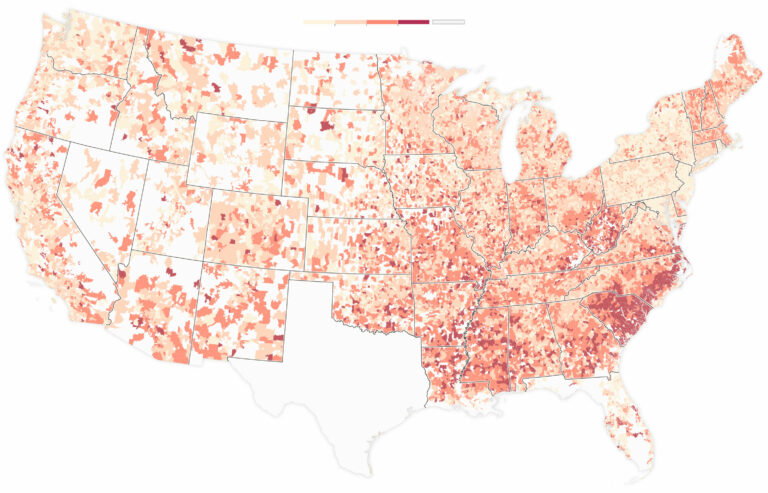Homeowners in regions most vulnerable to climate disasters are increasingly forgoing their home insurance premiums, leaving themselves exposed to potential financial ruin. According to new government data, this trend highlights how the effects of climate change are destabilizing core aspects of American life by making home insurance more expensive and difficult to maintain. This occurs even as wildfires, hurricanes, and other calamities increasingly threaten what, for many, is their most valuable asset.

Ethan Zindler, a climate counselor at the Treasury Department, commented, “Homeowners’ insurance is where many Americans are now feeling the financial effect of climate change directly, in their pocketbook. Nature doesn’t really care whether people are living in a blue state or a red state or another state, or whether you do or don’t believe in climate change.”
The Treasury Department’s analysis covered 246 million insurance policies issued by 330 insurers across the nation from 2018 through 2022. This data set gives the most complete picture to date of how climate change is affecting the American home insurance market. Usually, homeowners with mortgages are required by their lenders to have insurance. However, those who own their homes outright, perhaps because of family ownership over generations, have the option of dropping coverage.
According to the figures, the cost and frequency of insurance claims are rapidly rising in the highest-risk areas of the United States, as defined by the Federal Emergency Management Agency (FEMA). The data indicates that financial strain on insurance companies is worsening. Consequently, the price of insurance has risen far more in high-risk areas compared to other regions. As these trends intensify, more people are being removed from their insurance plans, either due to cancellations for missed premium payments or nonrenewals where insurers decline to extend coverage.
Rates of both cancellations and nonrenewals are increasing, with the most significant rises observed in high-risk areas.

In 2022, insurers canceled at least 10 percent of home insurance policies in over 150 ZIP codes nationwide because homeowners failed to pay their premiums. This is according to the data, which is the most recent available. Cancellation rates were highest in coastal areas of the Carolinas like Hilton Head, Charleston, and Myrtle Beach, which are especially vulnerable to hurricanes. High rates were also seen in parts of West Virginia, Arizona, and California.
The data doesn’t explicitly explain why homeowners stopped paying. However, Nellie Liang, the Treasury Department’s under secretary for domestic finance, stated that her team views this trend as an indicator of increasing financial strain on families, which has been worsened by climate change. “Households are not able to bear the burden by themselves,” Ms. Liang said.
Nonrenewal rates, where insurance companies refuse to renew policies even for paying customers, also increased more rapidly in high-risk areas. ZIP codes with the highest nonrenewal rates in 2022 were found in coastal South Carolina and parts of California, including Sonoma County and Yuba County, which have experienced wildfires. Areas in Tennessee, which have suffered severe storms, also saw high nonrenewal rates.
Ms. Liang noted that the instability in the home insurance market does not only affect homeowners. It also threatens property-tax revenues, which communities rely on. Furthermore, falling property values or an inability to rebuild can negatively impact tax receipts and local businesses that depend on homeowners.

The Treasury Department’s effort to collect this data was complicated by political disagreement about climate change and the regulation of insurance companies. The initial plan, announced in 2021 by the Biden administration, was to gather data directly from insurance companies. However, objections from some state insurance commissioners, supported by Republicans in Congress, led the Treasury Department to allow state commissioners to collect the data instead.
Seven states—Florida, Alabama, Louisiana, Georgia, Indiana, Montana, and North Dakota—declined to provide data. This meant that insurance companies headquartered in those states did not provide data. However, national insurers still provided data for homeowners they cover in those states. (Texas also had a data exception.)
Furthermore, participating states chose to withhold vital information, including data from their mandated high-risk-insurance plans. This omission means the data does not capture the experience of many homeowners facing the greatest risk from climate threats. The National Association of Insurance Commissioners (NAIC), which represents state commissioners and compiled the data, shared only a portion of it with the Treasury Department.
The Treasury Department, in its report, called for greater collaboration with state commissioners and the NAIC. The goal is to gather and publish data annually, and even extend the effort to include information for high-risk pools. The likelihood of this occurring remains uncertain. Republican state insurance commissioners recently urged the leaders of the new Department of Government Efficiency to eliminate the Federal Insurance Office, claiming the office was exceeding its authority.
Methodology
- Seven state insurance departments did not participate in the Treasury Department data collection: Alabama, Florida, Georgia, Indiana, Louisiana, Montana, and North Dakota. In some cases, national insurers provided coverage in those markets and submitted data for those states.
- Data from Texas insurers did not include nonpayment cancellations or nonrenewals.
- Risk categories are based on the composite risk score from FEMA’s National Risk Index.
- Policy cancellation and nonrenewal rates represent an average within each risk category.


